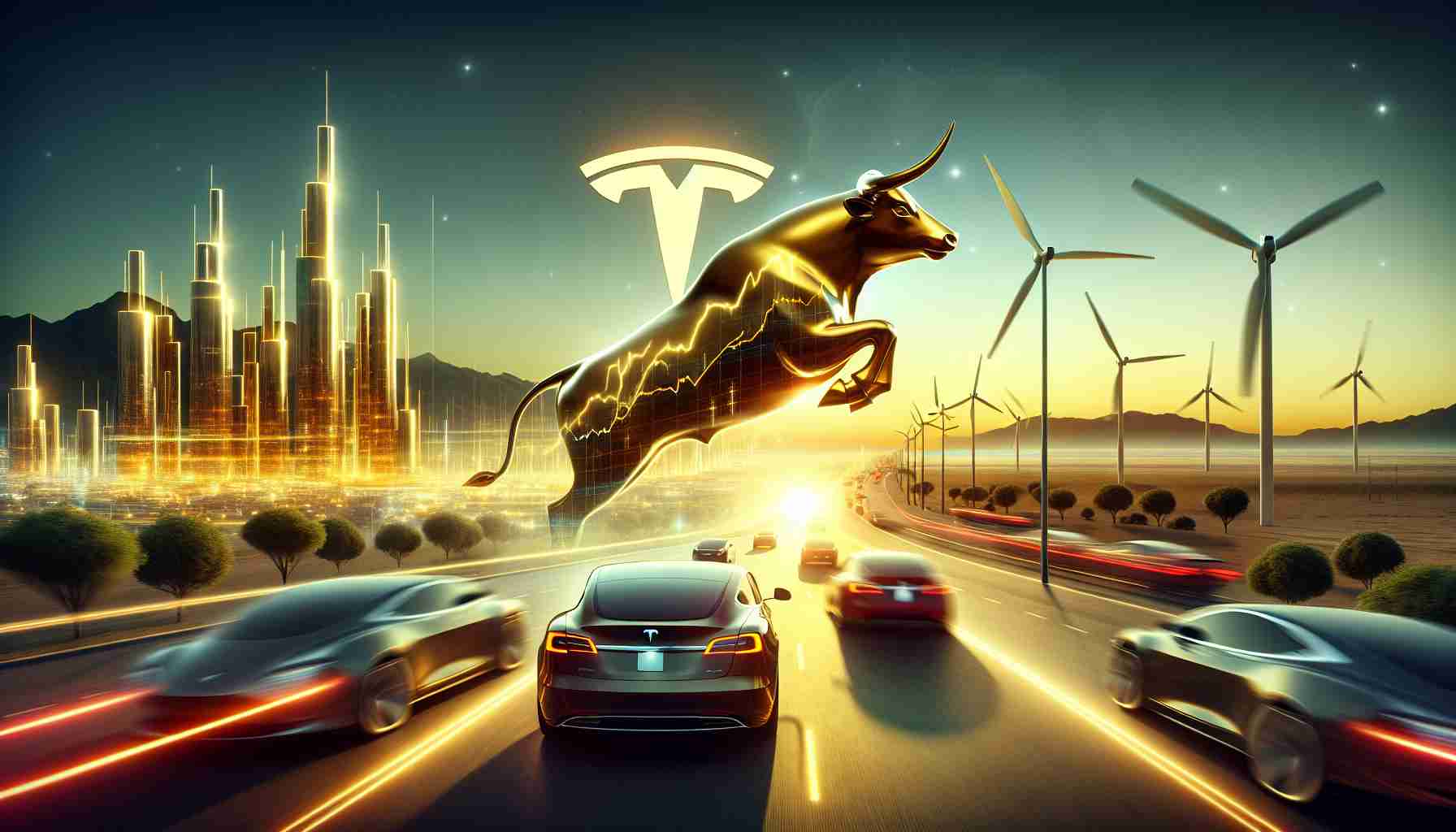- Tesla’s stock surged by 7% on Monday, nearing record highs due to potential policy changes.
- The Trump administration might expedite regulations supporting autonomous vehicles, benefiting Tesla’s Cybercab plans.
- Pause on safety probes could enhance Tesla’s growth in the autonomous driving sector.
- Legislative changes may accelerate testing, advancing Tesla’s competitive edge in the market.
- Tesla may manage the reduction of federal electric vehicle tax credits more effectively than rivals.
- Musk’s rapport with Trump could influence the trajectory of transportation advancements.
- Staying informed on market and economic shifts is vital for navigating both financial and technological landscapes.
A thrilling surge in Tesla’s stock electrified the financial world this past Monday, as shares ascended an impressive 7% by mid-morning, tantalizingly close to recent record highs. This dramatic rise aligns with whispers of a seismic policy shift as sources reveal that President-elect Donald Trump’s team is advocating for swift governmental action to support autonomous vehicles.
This potential regulatory acceleration could smooth the road for Tesla’s innovative Cybercab, projected to debut within the coming years. The news hints at a transformative agenda, where autonomous driving technology might flourish under a renewed regulatory spotlight, unlocking a new era for Elon Musk’s brainchild.
With a potential pause on safety probes that have long scrutinized Tesla’s autonomous systems, industry experts speculate significant ramifications for the electric vehicle market. Analysts suggest that legislative modifications could expedite testing processes, propelling Tesla into a futuristic lane of growth. Meanwhile, as the clock ticks down on federal electric vehicle tax credits, Tesla appears poised to weather the storm better than its competitors.
Amidst these opportunities and challenges, Musk’s unique relationship with Trump may continue to mold the future of transportation. This evolving narrative underscores the importance of staying ahead of market shifts, just as understanding financial dynamics is crucial in today’s unpredictable economic landscape.
Stay informed and prepared—whether navigating the roadways or the financial markets, knowledge is your greatest ally. As Tesla’s journey shows, embracing innovation can propel you towards greater horizons.
Tesla Stock Surge: Autonomy Driven by Policy Shifts
How might policy shifts impact Tesla’s growth in the autonomous vehicle sector?
The recent surge in Tesla’s stock, marked by a 7% increase, could be significantly influenced by anticipated regulatory changes supporting autonomous vehicles. President-elect Donald Trump’s administration is reportedly considering policies that could accelerate testing and implementation of autonomous driving technologies. This regulatory facilitation is expected to provide Tesla with a competitive edge, particularly for its Cybercab project. The potential reduction in safety probe scrutiny might further enable Tesla to streamline its innovation processes, paving the way for quicker adoption of advanced technologies in the electric vehicle (EV) market.
What are the advantages and disadvantages of these potential policy changes for Tesla and the broader EV market?
Pros:
1. Expedited Development: Legislative support could fast-track the testing and deployment of autonomous vehicles, benefiting companies like Tesla that are pioneers in this field.
2. Competitive Advantage: These changes could allow Tesla to maintain a lead over competitors, especially if they capitalize on early adoption and market presence.
3. Innovation Drive: Reduced regulatory barriers might encourage more innovation and investment in autonomous technology.
Cons:
1. Safety Concerns: Easing regulatory scrutiny could lead to compromised safety standards, possibly resulting in public backlash or safety incidents.
2. Market Saturation: Quicker deployment across the industry might lead to a more competitive market, pressuring Tesla to innovate constantly.
3. Economic Impacts: Legislative shifts could also alter the dynamics of federal subsidies or credits, impacting market economics.
What trends and predictions are emerging for Tesla and the future of autonomous vehicles?
The future of Tesla and the autonomous vehicle industry appears to be poised for several transformative trends. A possible extension of federal electric vehicle tax credits could bolster sales, although this remains uncertain. Tesla’s ability to innovate and capitalize on new policies may enhance its market position, potentially leading to new user experiences and mobility solutions. Moreover, as legislative discussions advance, we can expect an acceleration in EV market growth, driven by consumer demand for sustainable and cutting-edge technology.
In terms of predictions, industry analysts foresee a robust integration of AI and blockchain in autonomous vehicles to enhance security and efficiency. Additionally, Tesla’s potential partnerships or collaborations with tech firms for software and hardware development might surface, leading to enriched product offerings.
For more insights on Tesla and the EV market, visit Tesla. Stay informed and prepared as Tesla continues to navigate and shape the future of autonomous driving technology.




















